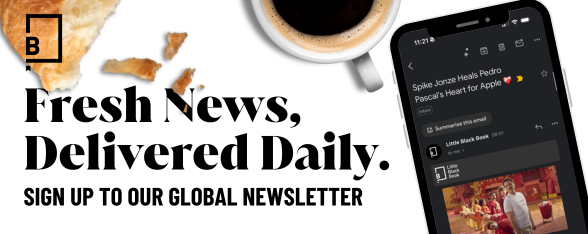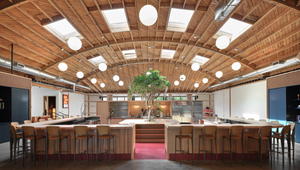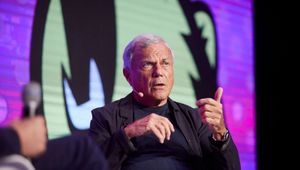
Carhartt’s Pioneering Support of Workers Is Stitched into the Brand

Space, so we’ve been told by Star Trek and, more recently, billionaires, is the ‘final frontier’. Workwear brand Carhartt, however, reckons the future is right here on Earth. It has recently launched a new campaign and brand platform, ‘Fit for the Next Frontier’, which is all about readying people for the future and backing working people.
As the country faces an unprecedented labour shortage, with millions of job openings, the campaign features 55 different types of tradespeople who are defining the next frontier in their industry – including a solar panel technician, farmer, carpenter, mechanic, arborist, and many more – the story is grounded in unity through the foundation of America.
But while this campaign looks to the future, it’s grounded in Carhartt’s history. The brand emerged in 1889 in Detroit, a manufacturer that made overalls for railroad workers. From the beginning, the wellbeing and rights of workers was a central tenet of the business, as vice president of creative & executive producer Brian Bennett explains. “Our founder was pretty amazing. He really left an incredible roadmap. Hamilton was very into workers rights. Think about industrialisation in the late 1800s to early 1900s. He fought for women in the workplace - some of our original workers were sewers. He fought for child labour laws, to keep children out of work. He fought for the eight hour work day. He was pretty ahead of his time,” says Brian.
The company is currently run by Mark Valade, Hamilton’s great grandson, who encourages the wider company to follow that roadmap laid out at the company’s foundation. At its core, everything the company does is centred around how it can help workers. “It’s something we think about with everything we design," says Brian. "Maybe it’s ‘how do we make someone’s day safer or warmer or more enjoyable?’ ‘How do you make the work process better?’ So we start thinking about fabrics that are lighter but just as durable and can handle the rain. That mindset is built on studying the work day."
Brian’s been with the brand for 10 years, and that ethos has shaped the in-house creative department as well as the way the company approaches marketing generally. Historically, Carhartt has had periods where it has embraced advertising - particularly under Hamilton Carhartt’s leadership who really established the brand’s voice - and other times it has held back and been less proactive, preferring to simply distribute the clothes to hardware stores and rely on word of mouth. When Mark took over in the 1980s, the business started to take marketing seriously again - though, muses Brian, that fallow period of around 50 years has allowed a certain mystique to grow.
“The product kind of sold itself through word of mouth. It was in local hardware stores. It was what was clever about it. It was actually kind of hard to find, it would only be at either a hardware store or a farm store. It was in channels that only real workers would find,” says Brian. “I think that that helped with the lore of why the product was so good - it was hard to find and only workers could find it.”
Now, with an in-house creative set up, there’s a hands-on heartiness to the campaigns and content. The first project that Brian worked on when he moved to Carhartt from the agency world was based around Carhartt’s hometown of Detroit, which was an early immersion in the brand’s roots and heritage. It allowed him to not only understand the brand’s tone and texture, but the why of its tone and texture. Detroit was only four hours from Chicago, where he had lived before - but it was a whole different character. “I really didn’t know a lot about Detroit and what I quickly learned was… of course Carhartt is from here. The city has such a grit to it. It really embodies the product: it’s relentless, it doesn’t give up, it’s constantly surprising you; it’s foundational. It’s coming out of a rough time, but it’s just a really blue collar city. I was like, ‘this is what we should be talking about, where we’re from.”
With that vision in mind, Brian could take that hard grafting Detroit spirit and apply it more broadly. For example the ‘models’ in the brand’s assets are mainly real American workers and so Brian spends his time working directly with the very people who depend on his company’s products. He’s built a network of carpenters, fishermen, glass blowers, vintners, farmers, construction workers, and more across the United States. Brian, who has in previous roles worked with athletes and high profile actors, says he far prefers making campaigns with working people. Often he finds that they have their own sturdy Carhartt overalls or coats that are a good 10 or 20 years old.
Even Carhartt’s relationship with its regular production partners, Pride of Gypsies comes from that real, hands-on connection with work. Co-founder Jason Momoa (yes, that Jason Momoa) reached out to Carhartt several years ago offering his services as an aspiring filmmaker who had grown up with the brand, coming from a family of builders and farmers. Since then, he and his business partner Brian Andrew Mendoza have directed and produce many campaigns, including the most recent campaign.
That new campaign ‘Fit for the Next Frontier’ takes all of that rich heritage and deeply rooted sense of purpose and re-orientates it, focussing on the future. And no, by future we don’t mean jumping on flashy tech trends or abandoning the values that have built the brand. It simply means understanding the current and future realities and challenges of work, particularly manual work. Directed by Brian Mendoza, the Covid-safe outdoor shoot featured over 200 workers from across America and across industries.

“We started looking at how the world’s been changing,” explains Brian of the starting point of the campaign. “We are definitely at a point where we’re going into a new chapter in life, a new way to think about how work is changing. There are so many things like robots, autonomous cars and trucks. It was funny to think of first, how is Carhartt ready for the future and, subsequently, how are you as a person ready to take on the future?”

It was when one of the writers landed on the line ‘Fit for the Next Frontier’ that everything fell into place. It blended the Americana heritage but also quirked a skeptical eyebrow at the billionaires racing to space, the so-called ‘final frontier’. For Carhartt, the future isn’t a nerdy Star Trek fantasy, but something to be created on Earth.
“We were a brand that was built on the frontier of America. We were built on farms and ranches. I’m sure you’ve been watching the likes of Elon Musk and Bezos going to space. We were spending a lot of time talking about these billionaires who are going off to space, and that’s exciting. But the reality of what we’re all going to do over the next 50 years is going to be here on land. Who’s going to build it? Who’s going to fix it? So we kept saying, the next frontier isn’t a bunch of billionaires racing to Mars - it’s actually building the community right where you live.”
There is, notes Brian, a particular humility within the company. Case in point, it’s only in the past five years that the 130-year-old company has employed an archivist. Having someone to dig into and organise the business’s historical documents has thrown up some fantastic gems. One that has caught Brian’s attention is a postcard from the 1930s that celebrates a factory built near a beauty spot in Kentucky for the benefit of the workers. The postcard carries the slogan ‘Back to the Land’, referring to a post-Depression movement which sought a middle path between capitalism and socialism, that looked to decentralise industry so that workers could enjoy the health and lifestyle benefits of living in rural areas. Given the current explosion in remote working and conversations about work-life balance, it’s a campaign that feels just as relevant today. In fact, it inspired a campaign this summer aimed at outdoor enthusiasts and people who'd been locked down at home for far too long.

It’s clear that whatever Carhartt does, it takes a long view and a deep view. And so the ‘Fit for the Next’ platform isn’t a one-off - it’s been planned as a multi-year campaign. Brian hopes it will run for at least three years and will be broken into chapters. The opening chapter lays the foundation and subsequent chapters will explore specific challenges and changes that will shape the world of work. For example, the next chapter will talk about ‘the next frontier of weather’. With more extreme weather events and temperatures and more frequent forest fires, the changing climate has very real consequences for workers.
From a non-US perspective, it’s fascinating to dig into Carhartt’s stance on being there for workers and the working class. Brian says internally they don’t necessarily view this through a capital ‘P’ political lens and aren’t interested in aligning with any party. Instead they’re guided by values, investing in vocational education programmes like Skills USA or the Future Farmers Association, which teaches young people how to work with their hands. Or local programmes like Grow Detroit. On Labour Day, they gave all of their sales to All Within My Hands, a charity set up by Metallica’s Lars Ulrich, which helps communities and funds skills education.
“If you're just standing for working class people and you don't have a political agenda, it's actually a pretty freeing feeling,” says Brian. “You know, it feels good to be able to be in a position to just say, ‘Hey, you work really hard. How do we help you out?’”
When it comes to representation and inclusion in the brand’s marketing content, it’s something that the team takes seriously and is evident in the new campaign. There are some challenges on that front, particularly when a collection or campaign focuses on farm workers. Less than 2% of farms in America are Black-owned (for reference, in 1920, that figure was 14%). What that means is that the team just has to work harder to find a diverse mix of real people. Brian speaks about working with Bertony Faustin, Oregon’s first Black winemaker, a former anaesthetics technician who has paved the way for African American winemakers in the state. Being able to platform makers and entrepreneurs like Bertony can inspire young people who might not believe that such paths are open to them.
Speaking to Brian, who has clearly embraced the Carhartt ethos, it’s clear to see that having met so many people who work with their hands, with so many different skills, he wants to share that knowledge with young people who don’t know what opportunities exist outside of an office. It’s easy to see why a creative with a sense of romance and adventure could fall for the brand’s earthiness and borderline obsession with making stuff with your hands. Shackled to screens, it’s no wonder that urban audiences are also falling in love with the brand. It speaks to a yearning to disconnect, to be able to build and nurture for oneself, to ‘touch grass’ in an increasingly untethered and dizzying digital world.
“By the time I get done with a photoshoot, I always say, ‘man, I am just worthless, I just met 20 different people who can do everything from changing high voltage light bulbs to making their own pots’. I have definitely fallen in love with watching hardworking people work on this job because it's such a skill and they have a work ethic that's just fun to watch. It's fun to learn from and study. I honestly wish more people had it.”















